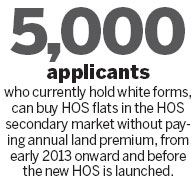Govt should boost immediate housing supply: estate analysts
Updated: 2013-01-15 06:51
By Oswald Chan(HK Edition)
|
|||||||

The government should unveil more measures to boost housing supply in a shorter time span to stabilize the local housing market's soaring price hike trend, real estate analysts in Hong Kong said.
Chief Executive Leung Chun-ying, who will unveil his first policy address on January 16 since he took office in last July, is anticipated to announce new measures to rein in skyrocketing home prices that are increasingly becoming unaffordable to local homebuyers.
"The government has three immediate measures to boost short-term residential land supply: converting more public and governmental land into residential uses, accelerating the existing industrial buildings' revitalization process and speeding up the land premium payment process so that the residential land supply can be hastened in a shorter time span," Knight Frank Director Thomas Lam told China Daily.
"We predict that the government may announce more measures to fasten the construction of public rental housing and residential flats under the Home Ownership Scheme to boost immediate supply in the next two to three years," Alfred Lau, a property analyst at BOCOM International, told China Daily.

The government is trying hard to find more land for residential purposes, and is considering relaxing the plot ratio and height restriction to enlarge the residential flat supply.
"Enhancing consistent residential flat supply is crucial in cooling down the market so that home prices would not rise further due to limited supply," Lau said.
The government had pledged various measures to expand residential supply. It announced in last September a pilot scheme to implement the "Hong Kong land for Hong Kong people" project on two land parcels in the Kai Tak development area. The two land parcels' development can produce 1,100 residential flats for local permanent residents, with a specific restriction that the flats can only be resold to local permanent residents over a 30 years period.
The administration also modified the "My Home Purchase Plan", and instead of the "rent-than-buy" small and medium "no frills" residential flats that had been advocated by former chief executive Donald Tsang, has put the flats on direct sales to homebuyers. The move is expected to boost home supply through the direct sales of 5,000 residential flats at Tsing Luk Street project, the first batch of flats under this plan.
In other moves to boost supply, the government will build 17,000 newly subsidized flats under the Home Ownership Scheme (HOS) between the 2016 to 2017 period and sell approximately 800 previously unsold HOS flats to meet the local sandwich class' housing needs. From early 2013 onwards and before the new HOS is launched, 5,000 eligible white-form applicants can purchase HOS flats in the HOS secondary market without paying land premium annually.
However, both Lau and Lam reckoned that the government will not announce more measures involving levy of stamp duties and tightening of mortgage loan underwriting standards to curb excessive demand for properties, as the government needs more time to gauge the measures' effectiveness before launching further tightening measures.
In last October, the government imposed an unprecedented 15 percent buyer's stamp duty (BSD) on all non-Hong Kong resident and corporate homebuyers, plus a 10 to 20 percent special stamp duty (SSD) on short-term home sales within a three year period.
The city's de facto central bank, the Hong Kong Monetary Authority, in last September also introduced the fifth round of prudential measures since 2010 by tightening the lending requirements of those who already have one mortgage loan on residential properties, and capping the maximum tenure for new home mortgage loans to 30 years to reduce the systemic business risks faced by local banks.
The previous fourth rounds of prudential measures since 2010 included the tightening of mortgage loan down payment ratio to increase the capital outlay required for making mortgage loans.
Looking ahead, real estate analysts are still optimistic toward the city's home price trend in 2013. Alva To, DTZ Hong Kong Managing Director, stipulated that "economic fundamentals will continue to determine the main trend of the residential flat prices. The uncertain global economy will continue to be a risk in the background but the Hong Kong residential market will depend more on local and regional economic performance."
According to Centa City Index which is used to gauge local residential price trend, Hong Kong home prices advanced nearly 20 percent for the whole of 2012 induced by the ultra-low interest rates, tight land supply and the influx of mainland home buyers. Local property prices had skyrocketed 1.93 times and 2.64 times, respectively, from the trough level registered in December 2008 and August 2003.
oswald@chinadailyhk.com
(HK Edition 01/15/2013 page2)